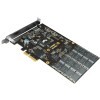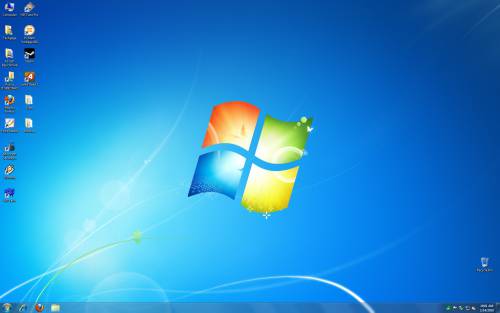- Qualcomm Launches Snapdragon 4 Gen 2 Mobile Platform
- AMD Launches Ryzen PRO 7000 Series Mobile & Desktop Platform
- Intel Launches Sleek Single-Slot Arc Pro A60 Workstation Graphics Card
- NVIDIA Announces Latest Ada Lovelace Additions: GeForce RTX 4060 Ti & RTX 4060
- Maxon Redshift With AMD Radeon GPU Rendering Support Now Available
OCZ RevoDrive 120GB PCI Express SSD

Looking to upgrade your PC with a fast SSD? How fast do you want it? If you answered “ultra fast”, then OCZ’s RevoDrive is worth a look. With read speeds of 500MB/s and beyond, a PCI Express interface, and a modest price premium, this SSD is hard to ignore. We’re on the bleeding-edge here, though, so this drive isn’t without a few caveats.
Page 2 – Test System & Methodology
At Techgage, we strive to make sure our results are as accurate and real-world applicable as possible. We list most of the steps and processes involved in setting up and conducting our benchmarking process below, but in the interests of brevity we can’t mention every last detail. If there is any pertinent information that we’ve inadvertently omitted or you have any thoughts, suggestions, or critiques, then please feel free to email us or post directly in our forums. This site exists for readers like you and we value your input.
The table below lists the hardware used in our current storage-testing machine, which remains unchanged throughout all of our testing, with the obvious exception of the storage device. Each drive used for the sake of comparison is also listed here.
|
Component
|
Techgage Hard Drive Test System
|
| Processor |
Intel Core 2 Quad Q6600 – 2.4GHz Quad-Core
|
| Motherboard |
Gigabyte GA-EP35-DS4
|
| Memory |
4GB Corsair 800MHz CAS 4
|
| Graphics |
Foxconn 8800 GTS 320MB
|
| Audio |
On-Board Audio
|
| Storage |
Corsair Nova V128 128GB
Intel X25-M G1 80GB Kingston SSDNow V Series 40GB Kingston SSDNow V Series 128GB Kingston SSDNow V+ Series 128GB OCZ RevoDrive 120GB PCI Express OCZ Summit 60GB OCZ Vertex Turbo 120GB OCZ Vertex 2 100GB Seagate Barracuda 7200.10 320GB Western Digital SiliconEdge Blue 256GB |
| Power Supply |
PC Power & Cooling Quad Silencer 750W
|
| Cooling |
Arctic Freezer 7 Pro
|
| Et cetera |
Lite-on DVD-RW
Windows 7 Ultimate 64-bit |
 Our Windows 7 Desktop for SSD Testing |
When preparing our SSD testbed for testing we follow these guidelines:
- General Guidelines
- No power-saving options are enabled in the motherboard’s BIOS.
- AHCI is enabled in the motherboard’s BIOS for best performance.
- HPET is configured to 64bit mode in the BIOS.
- Only Cold boots are utilized; for the purposes of our testing a boot is defined as the moment the power button is depressed to the moment the last systray icon and program has fully loaded after reaching the Windows 7 desktop. Auto-login is enabled.
- Windows 7 Optimizations
- User Account Control (UAC) is disabled.
- The OS is kept clean; no scrap files are left in between runs.
- Windows Update and OS power-saving settings are disabled.
All solid-state drives start in a factory fresh or HDDErase fresh state prior to testing. Windows 7 is manually installed and then SYSmark 2007 Preview is installed. Due to the nature of SYSmark, Windows 7 must be reinstalled upon completion of testing in order for many programs to function normally and benchmark consistently. As not all SSDs support TRIM technology, this process is important and ensures all of the drives are in a “dirtied” state before we collect the benchmark results.
For the time-being, cloned test images are not used as these can result in non-aligned partitions, which if it occurs will result in degraded SSD performance. Just as with Windows XP’s default sector offset causing degraded SSD performance, non-intelligent cloning software can have the same effect.
For testing, we ran all tests five times, dropping the highest and lowest results to finally average the middle three. And who said that college statistics class wouldn’t prove useful? If any anomalous results were seen, the test was run again. Given the complexities of modern computers, and especially today’s operating systems, we feel this provides the most accurate results possible.
Finally, we are seeking to constantly improve and expand upon our SSD testing methodology. We are activity seeking real-world workload scenarios that are bottlenecked by hard drives, so if you have any suggestions whatsoever or there is a program you would like to see included in our SSD content, then please drop by our forums and let us know! We are always looking to expand our SSD benchmarks and provide more useful and real-world results, and not just synthetic numbers.
Support our efforts! With ad revenue at an all-time low for written websites, we're relying more than ever on reader support to help us continue putting so much effort into this type of content. You can support us by becoming a Patron, or by using our Amazon shopping affiliate links listed through our articles. Thanks for your support!




